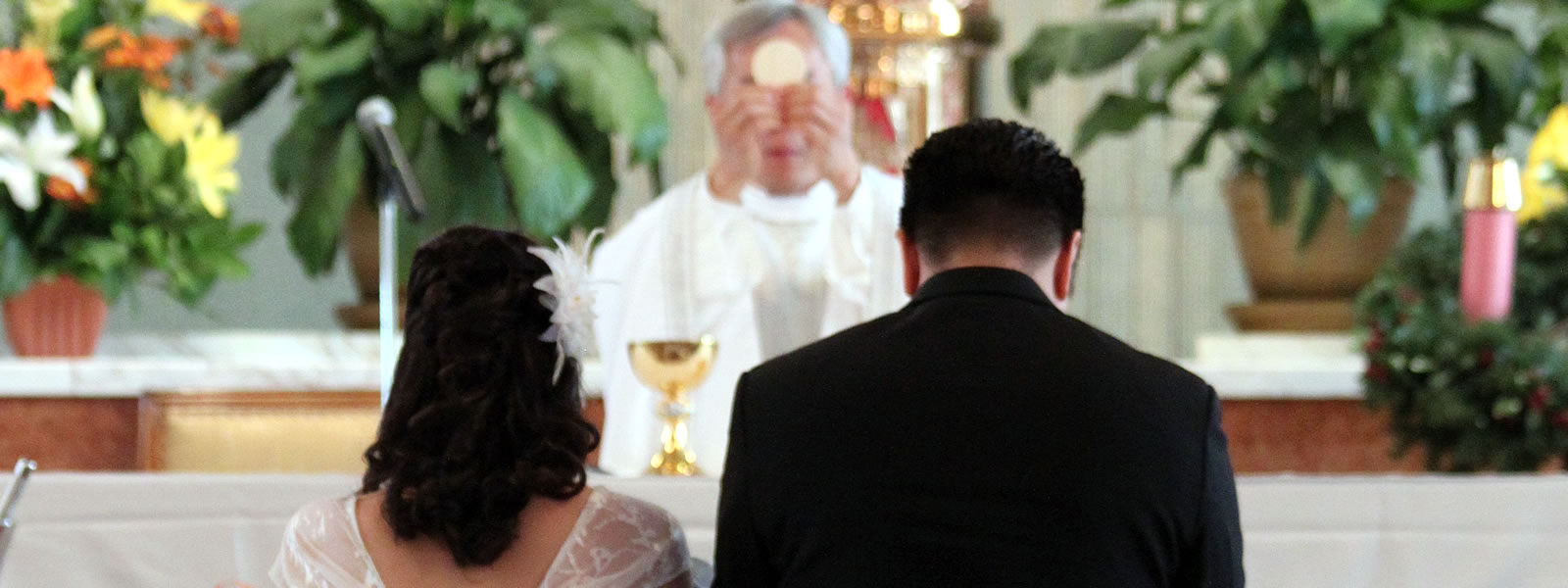In my experience trying to understand Catholic teaching on marriage, the language is more like love poetry than a practical, utilitarian assembling of rights and functions. See Song of Songs. WIFM = What’s In It For Me? is definitely NOT the Catholic understanding of the sacrament of marriage, quite the contrary, quite; even though, culturally, we may use the same word to describe a dramatically different understood reality. If our current crisis causes this greater clarity to come more fully into focus, grace doth abound. Rom 5:20.
In this season of marriage ceremony, let us pray for those who take on this most solemn vocation. I have recently begun attending a secular support group to offer support to divorced men and fathers as they bear the cross of divorce and separation from their children and the torture of the family court system, biased against men. Please pray for all who suffer this most desperate of crosses, regardless of their sins.
Catholic teaching on marriage elicits more practical opposition and misunderstanding than perhaps any other Catholic doctrine. When I ask people what is keeping them from full communion with the Catholic church, Catholic teaching and the canon law on marriage rank high on the list.
The reason for the opposition is easily understood. Christ calls married couples to lifelong fidelity, no matter what. A valid sacramental marriage cannot be dissolved for any reason by any power on earth. “What God has joined together, let no man put asunder.” (Matthew 19:6) This teaching seems so difficult that the apostles themselves could hardly believe it. “If this is the situation between a husband and wife,” they said, “it is better not to marry.” (Matthew 19:10) Christ himself admitted that the teaching was impossible without grace: “Not everyone can accept this word, but only those to whom it has been given.” (Matthew 19:11)
Some Protestant denominations wish to make an exception to this law in cases of adultery or abandonment. They base this exception in the so-called “exception clause” of Matthew 19:9. But St. Paul explains Christ’s teaching very clearly in 1 Corinthians 7:10: “To the married I give this command (not I, but the Lord): A wife must not separate from her husband. But if she does, she must remain unmarried or else be reconciled to her husband. And a husband must not divorce his wife.” For this reason, the Church allows for the “separation of bed and board” in cases of abuse and neglect, but in no way countenances the remarriage of those separated while the true spouse is still living.
Why? Why does Christ call Christian couples to such a high standard of fidelity, even to the point of embracing the cross of suffering? The reason is that Christian marriage is no mere human contract. It is a mystical participation in the sacrificial, self-giving love of Christ for his Church. (Ephesians 5) It is a special vocation to holiness, an ecclesial state in the same way that priesthood or religious life is an ecclesial state. Christian marriage participates in the sacramental mission of the Church to bring Christ to the world. St. John Paul II wrote that “Spouses are therefore the permanent reminder to the Church of what happened on the Cross; they are for one another and for the children witnesses to the salvation in which the sacrament makes them sharers.” (Familiaris Consortio)
The really glorious news is that God never calls us to a task without giving us the means to accomplish it. For this reason, the sacrament of marriage is accompanied by astonishing graces that are unique to the married state. The Second Vatican Council (Gaudium et Spes) put the matter quite beautifully:
“Authentic married love is caught up into divine love and is governed and enriched by Christ’s redeeming power and the saving activity of the Church, so that this love may lead the spouses to God with powerful effect and may aid and strengthen them in sublime office of being a father or a mother. For this reason Christian spouses have a special sacrament by which they are fortified and receive a kind of consecration in the duties and dignity of their state. By virtue of this sacrament, as spouses fulfil their conjugal and family obligation, they are penetrated with the spirit of Christ, which suffuses their whole lives with faith, hope and charity. Thus they increasingly advance the perfection of their own personalities, as well as their mutual sanctification, and hence contribute jointly to the glory of God.”
To be sure, not all married couples experience or enjoy the full benefit of these graces. The increase of sanctifying grace in the sacraments calls forth our willing cooperation. Pope Pius XI explains: “[since] men do not reap the full fruit of the Sacraments . . . unless they cooperate with grace, the grace of matrimony will remain for the most part an unused talent hidden in the field.” (Casti Connubii)
In order to reap the full benefits of sacramental marriage, one must live a sincere, faithful and generous Catholic life. St. John Paul II explains: “There is no doubt that these conditions must include persistence and patience, humility and strength of mind, filial trust in God and in His grace, and frequent recourse to prayer and to the sacraments of the Eucharist and of Reconciliation. Thus strengthened, Christian husbands and wives will be able to keep alive their awareness of the unique influence that the grace of the sacrament of marriage has on every aspect of married life.” (Familiaris Consortio).
Christian marriage is an awesome calling. Like all the sacraments, it is “a mystery,” but a mystery of astonishing fruitfulness. The law on Christian marriage is arduous because the end of Christian marriage is so sublime. Through it we are “caught up into divine love.” The Council teaches: “Parents should regard as their proper mission the task of transmitting human life and educating those to whom it has been transmitted. They should realize that they are thereby cooperators with the love of God the Creator, and are, so to speak, the interpreters of that love.” (Gaudium et Spes)”
“…Thy Kingdom come! Thy will be done! On earth, as it is in heaven.”
Love,
Matthew





